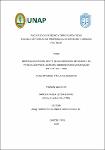Despenalización del delito de malversación de fondos y su persecución por el derecho administrativo sancionador en el Perú, 2017-2018

View/
Date
2020Author
Lecca Garate, Sandra Paola
Vela Tipa, Erika Juliana
Metadata
Show full item recordAbstract
En el delito de Malversación, los fondos públicos se mantienen en la esfera jurídica patrimonial del Estado y la finalidad en la que se ejecuta también es pública (aunque sea distinta a la prevista). Bajo esa premisa, la presente investigación tuvo entre sus objetivos establecer cuáles son los principales fundamentos jurídicos que determina la proscripción de la persecución del delito en mención a través del Derecho Penal en el Perú; y, su persecución y sanción por el Derecho Administrativo Sancionador. Para ello, se tuvo en cuenta el enfoque de la investigación cualitativa e investigación dogmática y socio jurídico. Como resultado del estudio se identificó que constituyen fundamentos de la proscripción de la persecución y sanción de la conducta de Malversación de Fondos a través del Derecho Penal: i) el tratamiento del delito objeto de la investigación no se enmarca en el principio de Mínima Intervención del Derecho Penal y de Lesividad, toda vez que no representa una conducta lo suficientemente peligrosa que lesione de manera importante el bien jurídico protegido; ii) la jurisprudencia Judicial viene recogiendo y aplicando dichos principios para imponer sanciones menos severas que la privativa de la libertad, así como la sanción atenuada en el Derecho comparado; y, finalmente, iii) se pudo constatar que existe marco normativo de la Contraloría General de la República para sancionar conductas análogas a la Malversación de Fondos en el ámbito del Derecho Administrativo Sancionador, la misma que debería replicarse con normas jurídicas aplicables a todos los ámbitos de la administración pública, por lo cual se ha formulado una propuesta legislativa en las recomendaciones del presente trabajo. In the offence of Embezzlement, public funds remain within the legal property sphere of the State and the purpose for which they are executed is also public (even if different from the intended purpose) Under that premise, the present investigation has, among its objectives, to establish which are the main legal foundations that determines the proscription of the prosecution of the crime of Embezzlement of Funds through the Criminal Law in Peru; as well as to determine the legal foundations that justify its prosecution and sanction by the Administrative Sanctioning Law. To this end, the approach of qualitative research and dogmatic and social-legal investigation was taken into account. As a result of the study, it was identified that these constitute the basis for the proscription of the prosecution and sanctioning of the conduct of Embezzlement through Criminal Law: i) the treatment of the crime under investigation is not framed within the principle of Minimum Intervention of Criminal Law and Lesivity, since it does not represent a sufficiently dangerous conduct that significantly damages the protected legal good. ii) the Judicial jurisprudence has been collecting and applying these principles to impose less severe sanctions than the deprivation of liberty, as well as the attenuated sanction in comparative Law; and, finally, iii) it was found that the regulatory framework of the office of the Comptroller General of the Republic exists to sanctions conducts analogous to embezzlement in the area of administrative sanctioning Law, which should be replicated with legal norms applicable to all areas of public administration, for which reason a legislative proposal has been formulated in the recommendations of this research work.
Collections
- Tesis [82]
The following license files are associated with this item:

